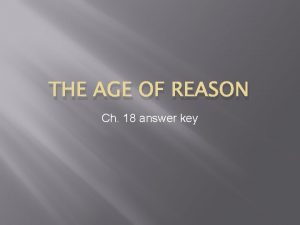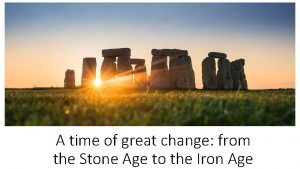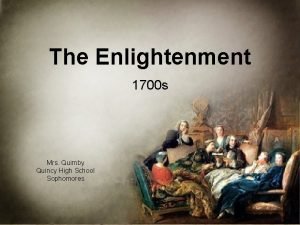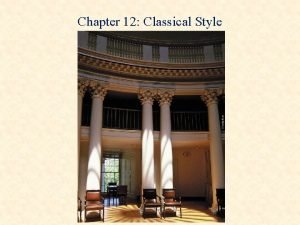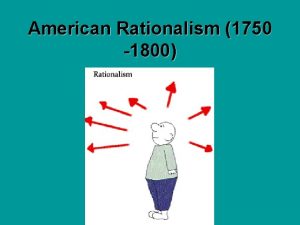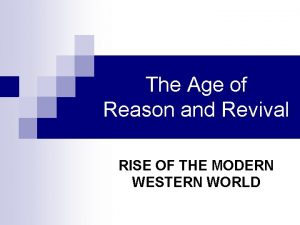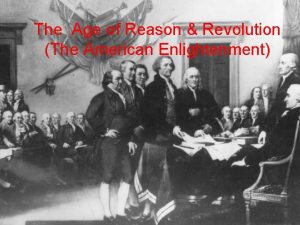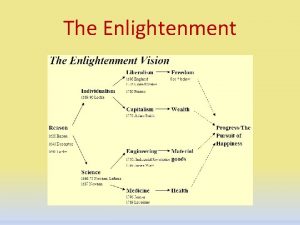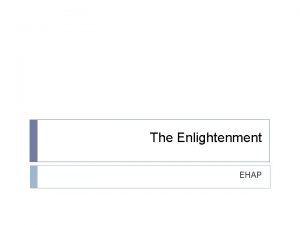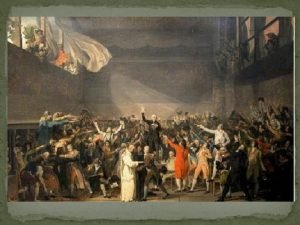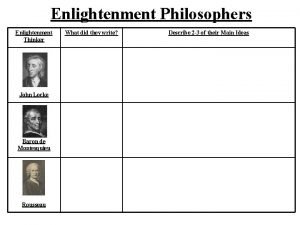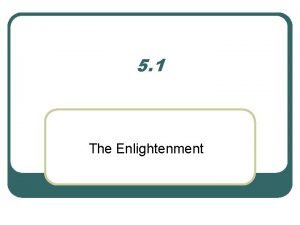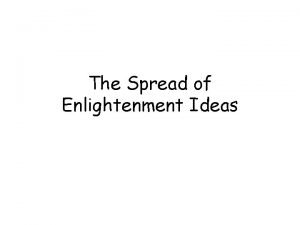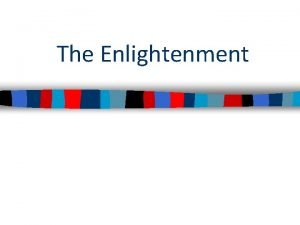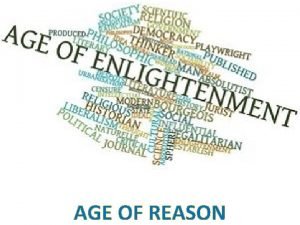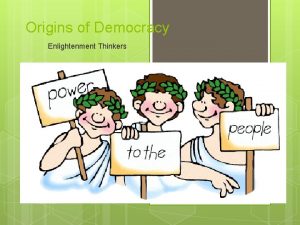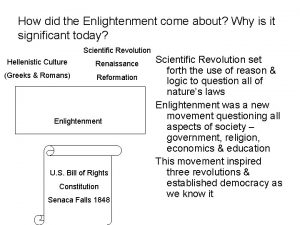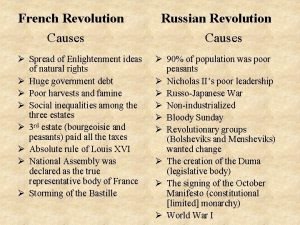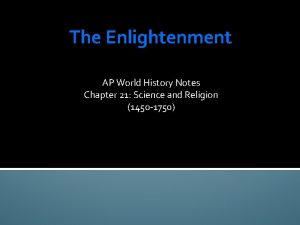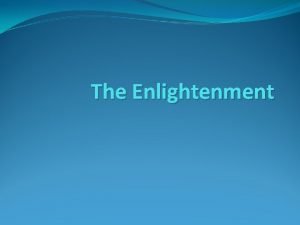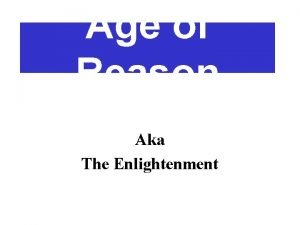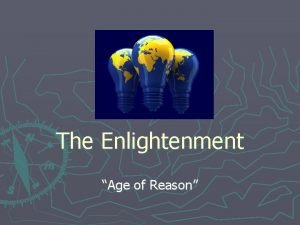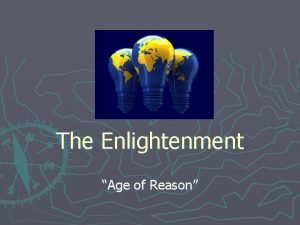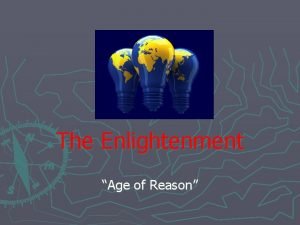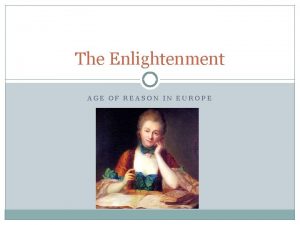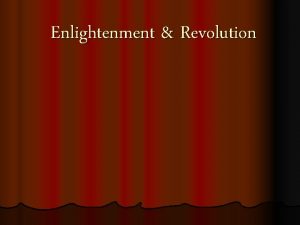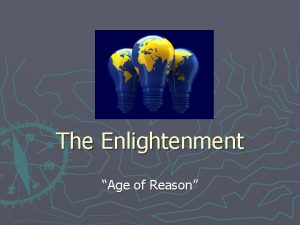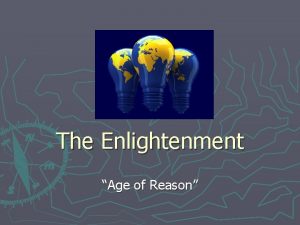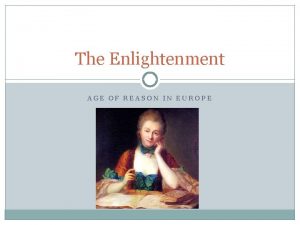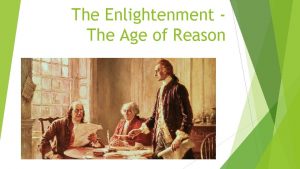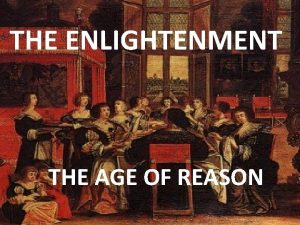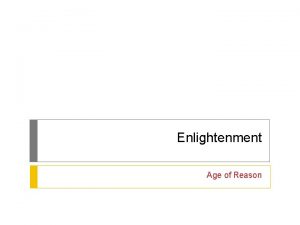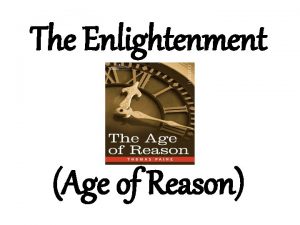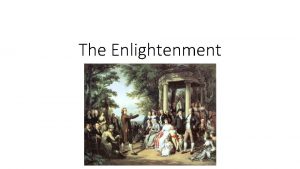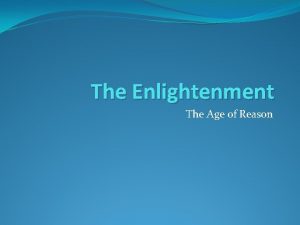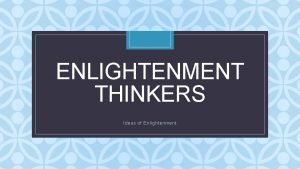The Enlightenment Age of Reason Enlightenment Ideas Principles




















- Slides: 20

The Enlightenment “Age of Reason”

Enlightenment Ideas & Principles Learning Objective Day 1 ►Students will be able to define the Enlightenment and key vocabulary, and identify the historical roots of this time period. ►Fill out the note sheet as the presentation progresses.

Enlightenment Key Vocabulary ►Enlightenment: a period during the 1600 s and 1700 s in which educated Europeans changed their outlook on life by seeing reason as the key to human progress. ►Age of Reason: another name for the Enlightenment ►Salons: a meeting of philosophers to discuss ideas – took place in France. ►Philosophe: a scholar or thinker ►Reason: Using logical thinking, not superstition

Roots of the Enlightenment ►The Enlightenment grew out of the Renaissance, Reformation, & the Scientific Revolution. ►What’s the same? : Enlightenment thinking challenged accepted beliefs. ►What’s new? : Enlightenment philosophers wanted to use the ideas & reason of the Scientific Revolution for problems in government and society.

Think/Pair/Share • In what ways are the periods of the Renaissance, Reformation, and Scientific Revolution similar to the Enlightenment? • Answer: They are similar because they all challenged accepted beliefs.

Think/Pair/Share • In what new areas did Enlightenment philosophers want to use reason? • Answer: They wanted to use reason for problems in government and society.

Light out of the Darkness ►A Frenchman, Bernard de Fontenelle, expressed this optimistic faith in reason and progress. In 1702, he wrote that the new century “will become more enlightened day by day, so that all previous centuries will be lost in darkness by comparison. ”

The Salons ►In France, thinkers called philosophes (French for “philosophers”) championed the idea of reason in government. ►Philosophers often gathered in informal meetings, called salons. There they exchanged & debated ideas for hours. ►Many salons were organized by women. Gatherings like these helped to shape and spread the ideas of the Enlightenment.

Why is this important? ►Many of our own ideas about government, such as the Declaration of Independence & the American Constitution got their ideas directly from the Enlightenment. ►In fact, many of America’s founding fathers studied the ideas of the Enlightenment thinkers during the American Revolution. Left to right: Benjamin Franklin, John Adams, Thomas Jefferson

MC Question • Which of these was greatly influenced by the Enlightenment? A. The mandate of Heaven B. The Magna Carta C. The Catholic Church D. The American Revolution

MC Question • Which of these was greatly influenced by the Enlightenment? D. The American Revolution

What a concept! ►Enlightenment thinkers rejected authority and upheld the freedom of individuals to think for themselves. ►Rene Descartes: “I think, therefore I am. ”

So what were the principles of the Enlightenment? • Reason – The world is “knowable”. Human understanding will advance. • Secularism – Dogmatism from organized religion should not intrude on public life. • Equality – (as a theory!) Belief in the betterment of the lower classes BUT not necessarily support for democracy. • Progress – a natural byproduct of reason. Pursuit of knowledge should lead to & bring practical benefits & results.

Add these definitions to your vocabulary list ►Social Contract: an agreement between people and their government, in which people give up some things in return for the benefit of having government. ►Natural rights: rights that people have simply for being human.

MC Question • In what way was the Enlightenment similar to the Scientific Revolution? A. BOTH focused on government and society B. BOTH highly valued reason and observation. C. BOTH denied the existence of God. D. BOTH were unimportant.

MC Question • In what way was the Enlightenment similar to the Scientific Revolution? B. BOTH highly valued reason and observation.

Enlightenment & Government ►Enlightenment thinkers criticized accepted ideas about government. Some questioned the medieval belief in the divine right of kings. ►Many Enlightenment thinkers stressed individual rights that governments must respect. ►Enlightenment thinkers also felt that people should have a say in their government.

Short Answer Question • What old, medieval concept about government did Enlightenment thinkers reject? • Divine Right of Kings • Name one thing they did believe about government: • Individual rights, people having a say in government.

Enlightenment and Religion ►Enlightenment thinkers believed humans were capable of discovering truth for themselves. ►Many believed in an all powerful deity (or God), but not in a specific church or holy book. Some called themselves Deists [Dee-ists]. ►Right and Wrong should be based on rational insight.

closing questions • What is another name for Enlightenment? • Age of Reason • Where would people meet to discuss ideas during the • • • Enlightenment? A salon What is the period during the 1600 s and 1700 s in which educated Europeans changed their outlook on life by seeing reason as the key to human progress? The Enlightenment took the reason of the Scientific Revolution and used it for_____ Government & Society
 The age of reason crossword puzzle answer key
The age of reason crossword puzzle answer key Iron age dates
Iron age dates Iron age bronze age stone age timeline
Iron age bronze age stone age timeline It is called the age of reason
It is called the age of reason It is called the age of reason
It is called the age of reason It is called the age of reason
It is called the age of reason Rationalism in american literature
Rationalism in american literature Age of reason and revival
Age of reason and revival American age of reason
American age of reason Francis bacon enlightenment ideas
Francis bacon enlightenment ideas Voltaire main ideas
Voltaire main ideas Whats an enlightened despot
Whats an enlightened despot John locke enlightenment ideas
John locke enlightenment ideas Enlightenment ideas
Enlightenment ideas Enlightenment ideas spread
Enlightenment ideas spread John locke enlightenment ideas
John locke enlightenment ideas Voltaire enlightenment ideas
Voltaire enlightenment ideas Rousseau ideas enlightenment
Rousseau ideas enlightenment Enlightenment ideas
Enlightenment ideas Enlightenment ideas
Enlightenment ideas Chapter 21 lesson 2 the ideas of the enlightenment
Chapter 21 lesson 2 the ideas of the enlightenment
